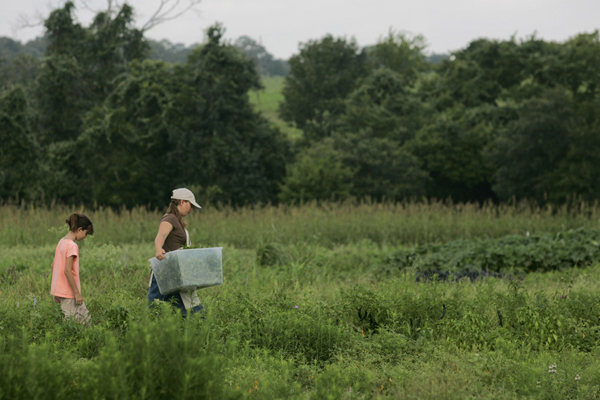Carina Stufflebeam (left), 10, walks with her mother, Jenny, as she carries a bin of freshly cut basil on the family’s 12-acre farm Thursday, July 12, 2007, in Brenham. The Stuffelbeam farm is part of a Community Supported Agriculture (CSA) organization started by the Jewish Community Center in Meyerland, where community members pay the family ahead of the growing season for a share of the harvest each week. Members in the CSA meet once a week. (Johnny Hanson / For the Chronicle)
Local, sustainably raised food is a wonderful phenomenon. Unlike a zero-sum approach where if X wins, then Y loses, local sustainable agriculture creates a win-win-win. It means clean air and water, restoration of our precious topsoil, habitat for wildlife, humane treatment of animals, fair income for farmers, healthy food for consumers, and a boost to our local economies. Or, at least, it could – if it ever gets past the stage of, at best, government bias and ignorance and, at worst, government-industry attacks.
For decades, the federal government’s policy was explicitly “get big or get out.” Farm programs and regulations were written explicitly to promote large-scale, industrialized agriculture and food production. This created a downward spiral: big companies gained market dominance and political influence, which lead to increased pro-big agriculture government policies, which lead to yet more loss of small farmers and greater consolidation in the hands of big companies, who gained even more power within our government.
In recent years, the local food movement has tried to reverse this trajectory. But it’s a difficult battle, both on the public policy front and on the ground. We’ve lost massive amounts of county canning kitchens, local butchers, local seed dealers and regionally adapted seed varieties, small-scale equipment manufacturers, and more. The laws and regulations written by and for Big Ag are all on the books and aren’t going away by themselves – and the big corporations fight against any loss of their market share, no matter how small. Establishing a truly viable, sustainable local food system will take years of committed activism by many people.
That’s where the Farm and Ranch Freedom Alliance comes in. We’re run by farmers and people actively engaged in sustainable agriculture every day. We know first-hand that we need systemic change, not band-aids – and that we need everyone working together to make it happen.
Thanks to grassroots activism, we’ve had some major successes in the last ten years. We stopped the National Animal Identification System, an industry-created plan for mandatory electronic tagging and tracking that would have posed insurmountable barriers for small sustainable producers. We convinced Congress to exempt small-scale, direct-marketing producers from onerous new food safety regulations. Here in Texas, we successfully fought for a strong cottage food law, which allows for legal sales of low-risk homemade foods, leading to the creation of over 1,000 new small businesses, and more.
At the same time, the challenges that are still in front of us can seem overwhelming. Many good mid-sized producers will still be subject to FDA’s new regulations, and we were not successful in keeping the FDA from adopting terribly complicated and overly burdensome regulations. The state health department appears to be on a vendetta against raw milk, to the point of using law enforcement in raids to intimidate customers. Too often, producers seeking guidance as to what they have to do in order to comply with the law are greeted not with help, but with inspectors and the threat of fines – or simply “you can’t do that.” It’s enough to make a person want to go hide in the backwoods, unless that becomes illegal too.
People can get past that desire to run away by connecting with other people who are passionate about our food and agricultural system at the Annual Farm and Food Leadership Conference, September 25 – 27 in Bastrop, TX.
Hosted by the Farm and Ranch Freedom Alliance and our sister educational nonprofit, the Council for Healthy Food Systems, this event brings together farmers, consumers, chefs, artisan food producers, and local food enthusiasts of all types. Top speakers will address the issues that challenge the local food movement – like water access, food waste, GMOs, what’s happening in DC, and even how to make a profit while staying true to sustainable methods. We also have sessions to help people navigate food in their daily lives, such as nutrition, sustainable sourcing at restaurants and retailers, and backyard gardening. Become inspired, informed and empowered – all while eating delicious local food!
Learn more about the conference at www.FarmAndRanchFreedom.org. While there, you can also sign up for free email alerts, become a member, and find other ways to become active in protecting our farms and our food.
 Judith McGeary is an attorney, activist, and sustainable farmer. After earning her B.S. from Stanford and her J.D. from the U.T. Austin, she practiced environmental and appellate law. During that time, she and her husband established their own livestock farm. After seeing how government regulations benefit industrial agriculture at the expense of family farms, she founded the Farm and Ranch Freedom Alliance to promote common-sense policies for local, diversified agricultural systems. Judith has been profiled in the Texas Observer and Edible Austin, appears in the documentary “Farmageddon,” and has been interviewed on numerous radio shows across the country.
Judith McGeary is an attorney, activist, and sustainable farmer. After earning her B.S. from Stanford and her J.D. from the U.T. Austin, she practiced environmental and appellate law. During that time, she and her husband established their own livestock farm. After seeing how government regulations benefit industrial agriculture at the expense of family farms, she founded the Farm and Ranch Freedom Alliance to promote common-sense policies for local, diversified agricultural systems. Judith has been profiled in the Texas Observer and Edible Austin, appears in the documentary “Farmageddon,” and has been interviewed on numerous radio shows across the country.

